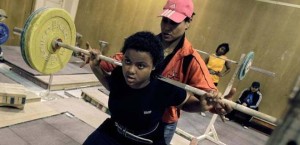Wow, I haven't blogged in three months. Why? Most of my time has been taken up by the course I am teaching this semester, a large lecture class at Brown called Sports in American Society.
[It's not that I haven't been writing at all. I've published several book reviews in some of my usual outlets like Brain, Child and The Providence Journal.]
Basically if I'm not in class lecturing or leading discussing, I'm preparing to lecture or lead discussion, or meeting with students, or re-doing the course reading, or re-watching the course documentaries... And, yes, even reading/watching to tweak things for next year's iteration of the course.
In that vein I've recently seen two powerful documentaries that are each so good I just had to write about them. And if you plan to take my class next spring, know you will be watching them (one is so good it just might even make an appearance this semester).
This is the story of Claressa Shields, a teenager from Flint, Michigan (yes, that Flint) as she struggles to make the 2012 Olympic team in women's boxing-- the first year women's boxing was ever offered at the Olympics.
I was lucky enough to get to see this at the Providence Children's Film Festival, where the Producer, Sue Jaye Johnson, spoke to audience members following the screening.
A photo posted by Hilary Levey Friedman (@hleveyfriedman) on
Claressa, who started boxing at 11, is a compelling character, so she plays a huge role in making the film work. But she is also surrounding by a compelling cast of characters (sister, parents, boyfriend, and most significantly, her coach and his family) who make the work sing. Their personalities combined with the long history of boxing and its connections to social mobility in this country (ok, yes, and also with violence) make this a film that will resonate within the sports community.
But T-Rex goes a step further in terms of linking Shields' story to issues of inequality, race, gender and universally admired themes like determination, hard work, and perseverance. For those reasons I not only want to assign it to students in my course next year, where we look precisely at sports through the lenses of race, gender, and history, but I suspect that when T-Rex is released on Netflix this summer it will make waves.
Not to mention that Shields' expected Olympic performance should help. She's already getting early press in NBC's Rio promos and it will be most interesting to see if endorsements ever come through for her, a la Gabby Douglas. At least this Olympic cycle, unlike last, there aren't any silly calls to have female boxers wear skirts (which I previously blogged about in my now defunct blog series Shrinking and Pinking).
Fantastic Lies is the latest installment in ESPN's worthy series, 30 for 30. But Fantastic Lies takes it to another level as this documentary, directed by Marina Zenovich, is truly compelling. The pace, the presentation of evidence, the way the interviews are woven together combine to leave the viewer thinking, questioning, and, in my case, feeling gobsmacked at the end (particularly when it came to the updates on individuals involved with the scandal).
I think the only suggestion I would have made is that I wish they had covered a bit more about the history of lacrosse in North America, especially its Native roots, and how that relates and doesn't to its contemporary prep school links-- and how the Duke situation halted or helped the growth of lacrosse, acknowledged today as one of the fastest growing organized sports in the U.S.
In terms of how it relates to my course this quote about sums it up:

I would add to this that it was a sport, an elite one at that, at a highly selective institution, which amplified things even more. Sports reflect, refract, transform, and multiply larger society and subcultures with which they are associated, as this documentary so eloquently shows. Look, you only need to check out all the memes last weekend from the Duke-Yale basketball game to see that these stereotypes remain unbelievably powerful.
So I'm hoping to show Fantastic Lies the last week of the semester, especially because one of the accused, Reade Seligmann, ended up transferring to Brown.
Stay tuned!

